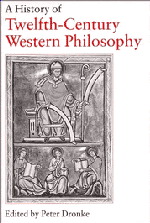Book contents
- Frontmatter
- Contents
- Preface
- Contributors
- List of abbreviations
- Introduction
- I Background
- II New Perspectives
- III Innovators
- 9 Anselm of Canterbury
- 10 Peter Abelard
- 11 William of Conches
- 12 Gilbert of Poitiers
- A note on the Porretani
- 13 Thierry of Chartres
- 14 Hermann of Carinthia
- IV The Entry of the ‘New’ Aristotle
- Bio-bibliographies
- General Bibliography
- Index of Manuscripts
- General Index
14 - Hermann of Carinthia
Published online by Cambridge University Press: 01 June 2011
- Frontmatter
- Contents
- Preface
- Contributors
- List of abbreviations
- Introduction
- I Background
- II New Perspectives
- III Innovators
- 9 Anselm of Canterbury
- 10 Peter Abelard
- 11 William of Conches
- 12 Gilbert of Poitiers
- A note on the Porretani
- 13 Thierry of Chartres
- 14 Hermann of Carinthia
- IV The Entry of the ‘New’ Aristotle
- Bio-bibliographies
- General Bibliography
- Index of Manuscripts
- General Index
Summary
Hermannus de Carinthia, Hermannus Dalmata, Hermannus Sclavus, or, as he preferred to call himself, Hermannus Secundus occupies a special place in twelfth-century philosophy and science in that he was ‘skilled in two languages’, and therefore familiar with both Latin and Arabic learning. Details concerning his life are meagre to an extreme. He calls Carinthia his native land, and the rubrics to his works sketch a shadowy existence in the South of France and the North of Spain between the years 1138 and 1143. We do not know what Hermann owed to his upbringing in the Duchy of Carinthia. His mother-tongue may have been a local Slavic dialect and he may have had some acquaintance with Greek there. Though he uses no Greek sources directly, he seems to know how Greek words are formed. His higher education must have taken place in the northern French schools, which attracted bright young men from far and wide, and it is probably with the French and, in particular, the Cluniac, interest in the newly conquered areas of Spain that Hermann's move south must be associated. He dedicated his translation of Ptolemy's Planisphere to Thierry, the well-known Platonist and Chancellor of Chartres Cathedral, addressing him as a ‘most loving teacher (diligentissime preceptor)’, whose character he has used as a model (tuam … virtutem … quasi proposition … speculum).
- Type
- Chapter
- Information
- A History of Twelfth-Century Western Philosophy , pp. 386 - 404Publisher: Cambridge University PressPrint publication year: 1988
- 5
- Cited by



